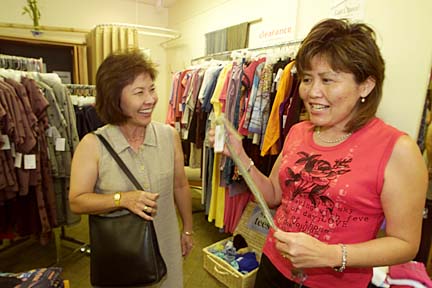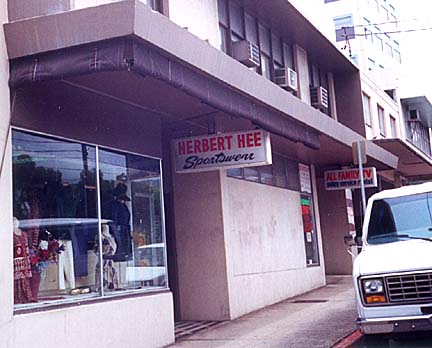


Clothing retailer TAKE OVER a women's clothing boutique that's tucked into a hole in the wall in a less-than-fashionable neighborhood with no place to park. And don't change the circa-1951 decor.
spans the generations
with style
NEIGHBORS
By Pat Gee
pgee@starbulletin.comThat's what Doreen Kobayashi did when she bought "Herbert Hee Sportswear" on Liliha Street in 1986. Her business thrived so well that 15 years later, moving across town and changing its name did not cost her a single customer.
In April she opened Le Muse in Diamond Head.
Kobayashi was a mother of two children in diapers when she first took over the store. She had no retail experience and was on maternity leave as a researcher for the state ombudsman's office when her husband, Wesley, pushed her into buying the business. He was a garment manufacturer who sold clothes to the Hees and "knew how well that little store did; it was a sound business," she said.
Fate seemed to be conspiring with her husband when Herbert Hee, the store's now-deceased owner, took one look at her and said, "I'm going to sell you the business."

"I was shocked. I thought, 'I can't do this, I don't have money to buy a business' ... But before I knew it," she became the owner on Labor Day, 1986."I was totally overwhelmed. I knew nothing about operating a store," said Kobayashi, who has an anthropology degree.
Luckily, Hee's daughter, Molly Leong, was there to help her for what was supposed to be only six months, but she ended up staying for 15 years. At age 69, Leong is still reluctant to call it a day -- "this is too much fun!" -- so she comes in once a week. The store's original seamstress, Lucy Mitsuda, now in her 80s, also does on-call work.
The reason the Hees wanted to sell the business in the first place was because after 35 years of retailing "Molly was tired and saw the writing on the wall. She saw her customers aging -- their average age was 50 to 70 years old," and she knew that the life of the store was probably nearing its end, too, Kobayashi said.
BECAUSE "my customer base was literally dying off," Leong knew she couldn't rely on the loyal following that multiplied since the store opened as a men's trouser shop in 1951. The business had grown solely by word of mouth.
"Every person who walked in was a referral or attracted to my window display," she said.
Kobayashi realized she had to expand her clientele by bringing in more contemporary styles to appeal to the younger woman. And part of it was because Kobayashi, then 33, "couldn't relate" to the clothes she sold, which included muu muus and "those pull-on polyester pants with polyester tops."
Most of the merchandise was purchased from local manufacturers, but Kobayashi wanted to branch out and buy from the mainland. She also purchased only "things I fell in love with," which unfortunately did not translate into a profit.
"The big joke (among her staff) was if Doreen likes it, don't buy it, because it won't sell. My tastes were too young for my clientele, so I had to learn the first rule of thumb: know your customer. They were a lot older than I was. I had to learn what they liked, the color, the style, the fit," she said.
Kobayashi also learned that if she wanted to introduce her older, mostly Japanese women customers to new and different styles, it had to be done slowly.
"It took me 15 years to bring them around," gradually getting them to trust her judgment and "try something new -- out of their usual realm, and that's exciting," she said.
"My tastes have always been eclectic. We sell nothing serious in the store. (I call it relaxed elegance.) Clothing should be happy and comfortable, fun to wear. Easy care, but not cheap."
NOW THE DAUGHTERS of her elderly customers are shopping at her store regularly. At first, they would come in only to buy a gift for mom, "because who'd want to shop where her mother shops?" or "why would they walk into a store on Liliha Street when they had the malls to shop at?" Kobayashi said. But when they saw some of the more modern styles, they'd say "I didn't know you sold this kind of stuff" and ask to try something on.
Walking into the old store was like stepping back into the Fifties, with its fluorescent lighting fixtures, industrial shelving, linoleum flooring, and furnishings that Hee had made himself. She kept it that way out of respect for the former owner and because renovating would have opened "a whole can of worms" with regard to building codes, Kobayashi said. She had to move because the building was sold.
At her new location on Monsarrat Avenue at the Diamond Head Center, "a nice little strip mall," the store has taken on a warm, feminine image which her old customers love. And it has parking.
Wind chimes, a water fountain and fresh flowers are incorporated into her store design and decor.
The new name of her store, "Le Muse," means "a source of inspiration." Her vision was to make women "feel empowered by how they buy clothing," to have their clothing help them feel good and "make a personal statement of style -- of who she is," Kobayashi said.